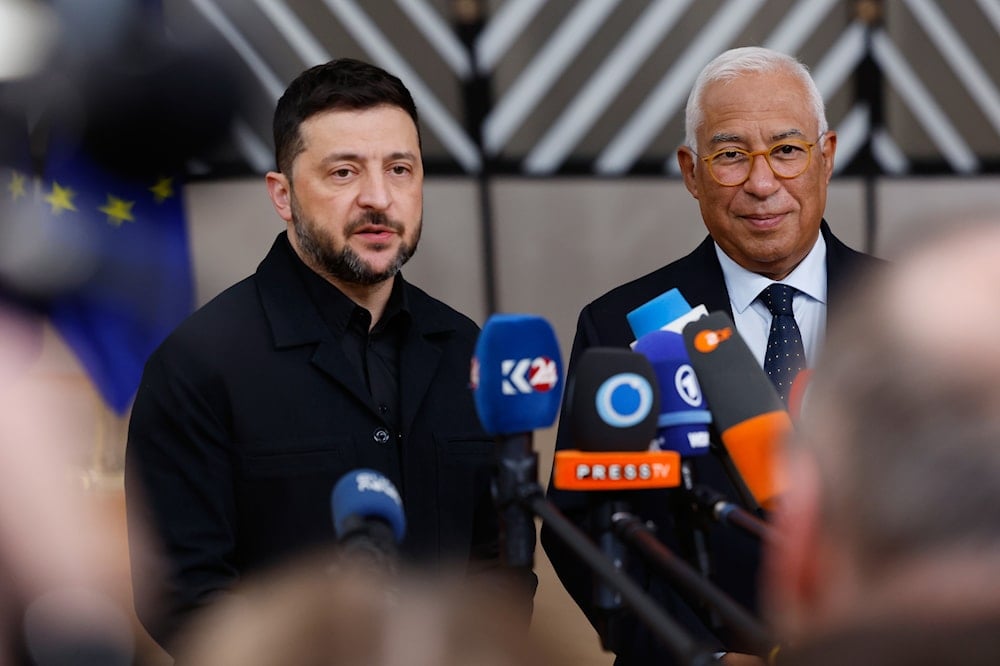EU agrees in principle on Ukraine funding deal despite Belgium threats
The EU has agreed in principle to fund Ukraine’s needs through 2027, despite Belgium’s objections to using frozen Russian assets.
-

Ukraine's President Volodymyr Zelensky, left, and European Council President Antonio Costa speak with the media as they arrive for an EU Summit at the European Council building in Brussels, on October 23, 2025. (AP Photo/Geert Vanden Wijngaert)
The European Union (EU) has agreed in principle to provide Ukraine with financial support through 2026 and 2027, EU Council President Antonio Costa reported on Thursday. The commitment comes despite growing legal and political objections from Belgium, which is threatening to block the proposed use of frozen Russian assets to fund the aid.
Speaking at the EU summit in Brussels, Costa stated that while technical details are still under discussion, the political will exists to ensure Ukraine’s financial and military needs are met for the next two years. Costa said, joined at the summit by Ukrainian President Volodymyr Zelensky, "We will take the political decision to ensure the financial needs of Ukraine for 2026 and 2027, including for the acquisition of military equipment."
Belgian Prime Minister Bart De Wever, whose country holds the bulk of the frozen Russian assets through the securities depository Euroclear, warned that he would oppose the plan unless three key demands are met. "If demands are met, we can go forward. If not, I will do everything in my power at the European level, also at the national level, politically and legally, to stop this decision," De Wever said.
He called for EU-wide risk sharing in case of legal retaliation from Russia, transparency about the legal framework, and inclusion of Russian assets frozen in other EU states.
EU leaders are expected to task the European Commission with drafting a formal legal proposal on using the estimated €140 billion ($163 billion) in frozen Russian assets to provide a "reparations loan" to Ukraine.
Sanctions package approved amid summit talks
While discussions continued over the proposed funding mechanism, Ukraine received additional support through a new EU sanctions package targeting Russia. The measures include a ban on Russian liquefied natural gas starting in January 2027, sanctions on the shadow tanker fleet, and restrictions on two independent Chinese oil refineries.
Zelensky welcomed the steps, which coincide with new US sanctions targeting major Russian oil companies, adding that his appearance at the Brussels summit followed reports that US President Donald Trump had briefly entertained, and then cancelled, plans to meet Russian President Vladimir Putin in Budapest.
Even as the EU-Ukraine funding deal moves forward politically, divisions remain over how the money should be spent. Some member states want all of the loan allocated for military procurement, primarily through European arms suppliers. Others argue that a portion should be available for general budget support, including the purchase of US weapons.
A senior Ukrainian official told Reuters that Kiev needs access to the funds before the end of the year and should have autonomy over how they are used. The European Commission has suggested a compromise, and the bulk of the funds would go toward Ukrainian and European weapons procurement, while a smaller portion could support general budget needs.
Russia has denounced the EU’s proposal to use its frozen assets as an illegal seizure of sovereign property, threatening political and legal retaliation.
Despite this, Costa emphasized that the EU remains committed to supporting Ukraine’s sovereignty and territorial integrity. Moreover, the summit’s final communiqué is expected to reaffirm this position while moving forward with the next phase of legal and financial planning.

 3 Min Read
3 Min Read











